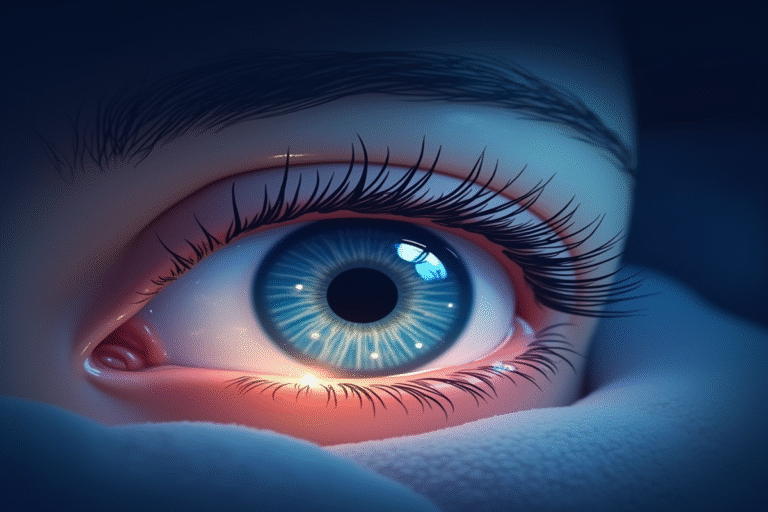Every night as you drift off to sleep, your body initiates numerous maintenance routines. While you dream, a remarkable cleaning process takes place right on the surface of your eyes—a sophisticated biological system that works continuously to keep your vision clear and your eyes healthy.
The Tear Film: Your Eye’s First Line of Defense
Your eyes are constantly covered by a thin layer of fluid called the tear film. This is not just water—it’s a complex, three-layered structure that performs several vital functions:
- Mucin layer: The innermost layer that helps the tear film stick to the cornea
- Aqueous layer: The middle, watery component that hydrates the eye and delivers nutrients
- Lipid layer: The outermost oily layer that prevents evaporation of the tears
During sleep, this tear film changes slightly in composition, focusing more on cleaning and less on lubrication, since lubrication is mainly needed when we blink frequently during the day.
The Nighttime Cleaning Crew
When you close your eyes at night, several fascinating processes begin:
Your meibomian glands—tiny oil-producing structures in your eyelids—continue secreting lipids that trap foreign particles. These glands can become more active during certain sleep phases, helping the cleaning process while you rest.
Even though you are not blinking, your eyes make subtle movements during REM sleep that help distribute tears across the surface. Scientists have found that these movements support both dream experiences and eye maintenance.
The Remarkable Drainage System
Most impressive is your lacrimal drainage system—a network of small channels that acts like your eye’s plumbing. Located in the inner corners of your eyes, these ducts collect tears full of debris and channel them into your nasal cavity.
This explains why you sometimes wake up with “sleep in your eyes” (also called “eye gunk” or technically, rheum). This crusty material is evidence of your eyes’ overnight cleaning—debris that has been collected but not completely drained away.
A Balanced Ecosystem
Your eyes maintain a delicate microbial balance. During sleep, antimicrobial proteins in your tears become more concentrated, helping to neutralize potentially harmful bacteria. This is important because your closed eyelids create a warm, dark place that could otherwise encourage bacteria to grow.
Research published in the journal Science Advances found that the composition of nighttime tears is significantly different from daytime tears, with specific proteins designed for overnight defense and maintenance.
When the Cleaning System Falters
This cleaning mechanism is not perfect. Age, environmental factors, medications, and certain health conditions can disrupt this finely tuned system. Dry eye syndrome, for example, occurs when tear production or quality is reduced, leaving eyes inadequately cleaned and less protected.
Interestingly, sleep quality itself affects how well your eyes are cleaned. Poor or insufficient sleep can reduce the effectiveness of these processes, creating a cycle where eye irritation may further disturb your sleep.
Supporting Your Eyes’ Natural Cleaning
While your eyes have developed this remarkable self-cleaning system, you can support it by:
- Getting enough quality sleep to enable a full cleaning cycle
- Staying hydrated to support tear production
- Removing eye makeup before bed to prevent interference
- Using humidifiers in dry environments to prevent excessive tear evaporation
Next time you wake up with clearer vision after a night of rest, take a moment to appreciate the extraordinary maintenance work your body does while you sleep. Your eyes are not just resting—they are going through an active, sophisticated cleaning process that keeps them ready to take in the sights of the world each day.





